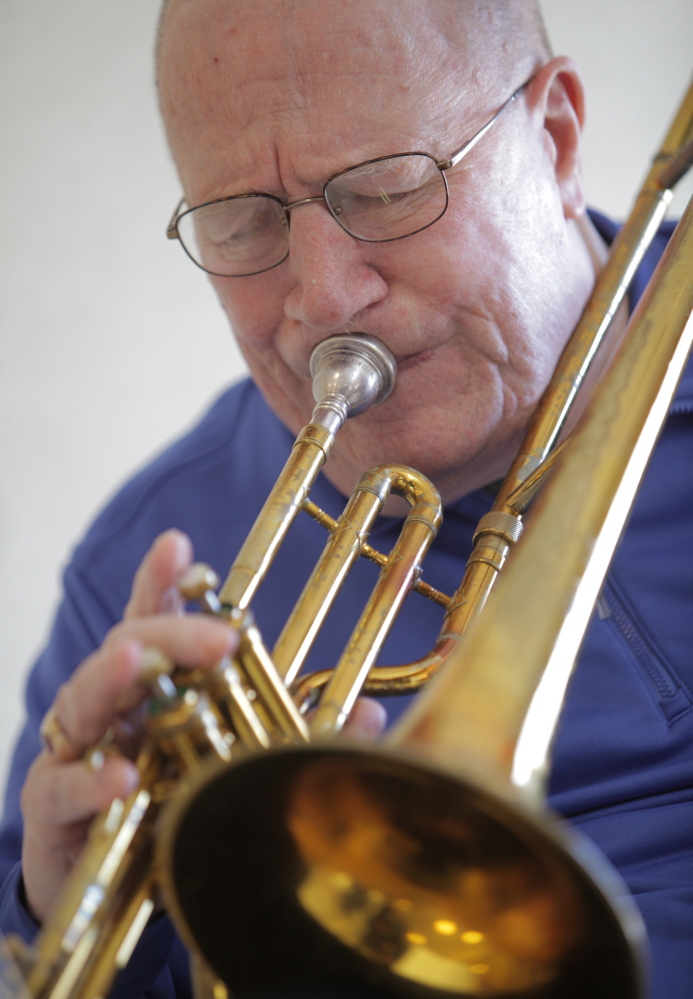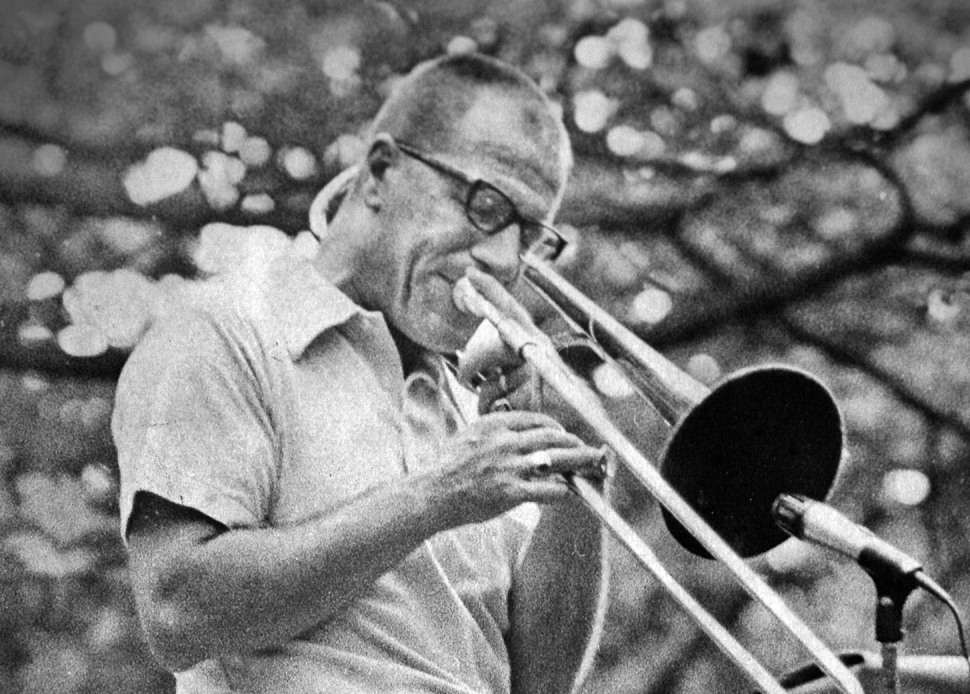In a small, comfortable sitting room at the Maine Veterans’ Home in Scarborough, 81-year-old Barbara Coty adjusts the sheet music on a metal stand in front of Don Doane’s wheelchair. Doane, who is 82, holds a gleaming brass trombone on his lap.
“Ready?” Coty asks.
He nods. She presses a button on a CD player.
“One, two, three…”
The room suddenly fills with the lush sounds of the jazz standard “Autumn in New York.” Doane hoists the trombone to his lips and begins to play.
It’s magic.
He plays a valve trombone instead of the slide trombone he grew up with. The slide requires two hands, and Doane has the use of only one.
Thirteen years ago, he had a stroke that paralyzed the entire left side of his body. He remembers waking up in the hospital.
“I can hear everything that’s going on, but I’m paralyzed,” Doane said. “I can’t move. I can’t speak. One of the doctors said, ‘He’ll never play the trombone again.’ ”
Doane’s brother, Al, said Don was devastated but determined. “He’s stubborn,” Al said. “Always has been.”
Don Doane put that stubbornness to work, teaching himself, over many months, to play the valve trombone with one hand.
If you close your eyes and listen, you don’t hear a handicap. You hear the soft, clear tones of a talented musician.
Doane once had a front-row seat – lead trombone, to be exact – in some of the most popular jazz bands in the country. Mention a name from the big-band era of the 1950s and ’60s, and it’s a good bet he’ll have a story to share.
Sarah Vaughan? She bought him a Coke at a bar in Chicago. Duke Ellington? Don saved the day when Ellington was performing in Portland and his trombonist got sick. Count Basie?
“I was the only white guy in the band,” Doane said, “and when I stood up to play, people would say, ‘Who’s that guy?’ ”
He first picked up the trombone in grade school in South Portland. By the time he graduated from Boston University, he had no doubt about his future career.
“That’s all that was running through my mind all the time, was music, music, music, music,” he said.
Doane married his high school sweetheart, Barbara Concannon, and at her urging decided to go to some auditions in New York.
He remembers band leaders telling him that nobody from Maine could possibly know how to play jazz. But the minute he blew that slide trombone, they changed their minds.
It was about this time that he made a decision that would change his life for the better. He stopped drinking.
“One morning I was shaving and I couldn’t look in the mirror. I knew I wouldn’t like what I saw, the type of person I was when I was drinking. I became a better person – a better teacher, better husband and father,” Doane said.
He said it also made him a better, more focused musician.
Doane got his first big break when he was hired in 1962 to play with Maynard Ferguson. He said Ferguson was a guy with a big heart.
“One time we came off the road in New York and he said, ‘How long has it been since you’ve seen your family?’ I said about three months. ‘Here,’ he said. He gave me the keys to his brand new Buick and 50 dollars. ‘Go on home and see your family.’… So I went home to Maine driving this big Buick with New York plates.”
Doane toured with some of the greats – Stan Kenton, Woody Herman, Count Basie. But eventually there was a hole in his life that even music couldn’t fill.
“One day in September and we’re riding on the bus, I think we were in Iowa or someplace like that,” he said. “I saw these little children standing and waiting for the school bus with their lunch pails, and I started thinking of my own kids back home.”
In 1965, he stepped off the world stage and moved his family from New York back home to Maine, settling down to teach music in Westbrook.
Tony Boffa, today a successful band leader himself, was one of Doane’s students.
“He had a way of firing people up,” Boffa said. “You felt like you could do it when you were around him. Phenomenal teacher.”
Boffa said that for a long time, Doane was one of the best trombonists in the country. But few in Maine realized they had a superstar in their midst.
“I get the feeling that he just needed to know that he could compete at that level,” Boffa said. “When that became obvious … he said, ‘I can do this, but I don’t want to anymore.’ ”
Even after his stroke in 2001 – and the continuing paralysis of his left side – Doane continued to teach and perform.
But that life came to an abrupt halt three years ago when his wife, who had health issues of her own, could no longer help care for him at home. After 60 years together, they’d have to live apart.
Doane said he quickly spiraled into a deep depression. The only thing that kept him from completely giving up was the thought of never seeing his grandchildren again. But music? For the first time in his life, his heart just wasn’t in it. Don Doane put his trombone away.
He eventually moved to the Maine Veterans’ Home, where he met Coty, a longtime volunteer. At the suggestion of the home’s activities director, Coty encouraged Doane to consider playing music again.
“She mentioned something about, ‘You don’t think you can play again?’ ” Doane said. “And I said, ‘Well, I’ve got a valve trombone at home.’ ”
A plan was hatched.
“He showed me how to put (the trombone) together,” Coty said, “oil the valves, take it apart. So we started practicing every day.”
“She was my savior,” Doane said. “She was really the one that got me back playing again. … It makes me happy to be alive.”
Coty says that listening to Doane play the jazz standards she grew up with brings back memories of happy times with her late husband.
“I think about a lot of things … when he plays certain songs,” Coty said. She smiles as she says, “Don’t get me crying.”
The two have set an ambitious goal – to find a way for him to play the slide trombone again.
In the meantime, if you happen to be walking down hallway C at the Maine Veterans’ Home in Scarborough and you hear the golden tones of a horn being played – well, you’re listening to one of the greats.
Copy the Story LinkSend questions/comments to the editors.




Success. Please wait for the page to reload. If the page does not reload within 5 seconds, please refresh the page.
Enter your email and password to access comments.
Hi, to comment on stories you must . This profile is in addition to your subscription and website login.
Already have a commenting profile? .
Invalid username/password.
Please check your email to confirm and complete your registration.
Only subscribers are eligible to post comments. Please subscribe or login first for digital access. Here’s why.
Use the form below to reset your password. When you've submitted your account email, we will send an email with a reset code.